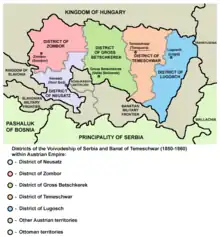| Neusatz District | |||||||||||
|---|---|---|---|---|---|---|---|---|---|---|---|
| district of the Voivodeship of Serbia and Banat of Temeschwar | |||||||||||
| 1850–1860 | |||||||||||
 Districts of the Voivodeship of Serbia and Banat of Temeschwar; Neusatz District is shown in lilac | |||||||||||
| Capital | Neusatz (Serbian: Novi Sad) | ||||||||||
| History | |||||||||||
• Established | 1850 | ||||||||||
• Disestablished | 1860 | ||||||||||
| |||||||||||
| Today part of | Serbia, Croatia | ||||||||||
Neusatz District (Serbian: Novosadski okrug or Новосадски округ; German: Neusatzer Distrikt,[1] Kreis Neusatz[2] from 1853; Croatian: Novosadski okrug; Hungarian: Újvidéki körzet; Slovak: Novosadský obvod) was one of five administrative districts (originally Districte, modern spelling Distrikte; Kreise, lit. 'circles', from 1853) of the Voivodeship of Serbia and Banat of Temeschwar (a crown land within Austrian Empire) from 1850 to 1860. Its administrative center was Neusatz (Serbian: Novi Sad).
History
The crown land Voivodeship of Serbia and Banat of Temeschwar was formed in 1849 and was initially divided into two districts: Batschka-Torontal and Temeschwar-Karasch. In 1850, crown land was divided into five districts and the territory of Batschka-Torontal District was divided among Neusatz District, Zombor District and Großbetschkerek District.
In German the original term used for these subdivisions was Districte[1] (modern spelling Distrikte). In 1851 they were divided into subdivisions called (politische) Bezirke,[1] usually translated as '(political) districts'.
In Bach's reforms from 1853 the Districte became Kreise,[3] a form of administrative division already in use across much of the non-Hungarian part of the Empire since the 18th century. The term Kreis, literally 'circle', is also often translated as 'district'. The subdivisions of the Kreise were also called Bezirke in German, or Amtsbezirke ('office districts', in reference to the Bezirksämter or 'district offices' which ran them) to distinguish them from other types of Bezirk. The change of name was not superficial – different political, administrative and judicial structures were used in each subdivision type. (See also Districts of Austria § Habsburg Monarchy and Austrian Empire.)
In 1860, the Voivodeship of Serbia and Banat of Temeschwar and its five districts were abolished and the territory of the Neusatz District was divided among Batsch-Bodrog County (part of the Kingdom of Hungary) and Syrmia County (part of the Austrian Kingdom of Slavonia).
Geography
The Neusatz District included parts of southern Bačka and northern Syrmia. It shared borders with the Zombor District in the north, Großbetschkerek District in the north-east, Military Frontier in the south-east and Austrian Kingdom of Slavonia in the west.
Demographics
According to 1850 census, the population of the district numbered 236,943 residents, including:[4]
Subdivisions
In 1851 Neusatz District was subdivided into 5 political districts (politische Bezirke), which were structurally akin to the modern districts of Austria (names as defined, modern German in parentheses):[1]
The city of Neusatz (Novi Sad) was separate from the political districts; the district which carried its name covered the area around the city, which acted as its seat/capital[1] (i.e. it was a statutory city).
In 1854 Neusatz District (now a Kreis) was subdivided into 5 'office districts' (Amtsbezirke) (names as defined, modern German in parentheses):[2]
Cities and towns
Main cities and towns in the district were:
- Alt Betsche (Stari Bečej)
- Batsch (Bač)
- Futok (Futog)
- Hodschach (Odžaci)
- Illok (Ilok)
- India (Inđija)
- Irick (Irig)
- Neusatz (Novi Sad)
- Plankenburg (Palanka)
- Ruma (Ruma)
- Schid (Šid)
- Temeri (Temerin)
- Thomasberg (Sentomaš)
Most of the mentioned cities and towns are today in Serbia, while town of Illok (Ilok) is today in Croatia.
See also
References
- 1 2 3 4 5 Gesetz vom 17. August 1851, 192/1851: "Verordnung des Ministeriums des Innern, womit die durch Allerhöchste Entschließung sanctionirte Organisation der politischen Verwaltung der Woiwodschaft Serbien und des Temeser Banates kundgemacht wird". Reichs-Gesetz-Blatt für das Kaiserthum Österreich (in German). 1851-08-17. Retrieved 2023-07-13 – via ÖNB-ALEX - Historische Rechts- und Gesetztexte Online.
- 1 2 Gesetz vom 1. Februar 1854, RGBl. 28/1854: "Verordnung der Minister des Inneren, der Justiz und der Finanzen vom 1. Februar 1854, betreffend die politische und gerichtliche Organisirung der serbischen Woiwodschaft und des Temeser Banates". Reichs-Gesetz-Blatt für das Kaiserthum Österreich (in German). 1854-02-01. Retrieved 2023-07-04 – via ÖNB-ALEX - Historische Rechts- und Gesetztexte Online.
- ↑ Gesetz vom 19. Jänner 1853, RGBl. 10/1853: "Verordnung der Minister des Inneren, der Justiz und der Finanzen vom 19. Jänner 1853, womit die Allerhöchsten Entschließungen über die Einrichtung und Amtswirksamkeit der Bezirksämter, Kreisbehörden und Statthaltereien, über die Einrichtung der Gerichtsstellen und das Schema der systemisirten Gehalte und Diätenclassen, sowie über die Ausführung der Organisirung für die Kronländer Oesterreich ob und unter der Enns, Böhmen, Mähren, Schlesien, Galizien und Lodomerien mit Krakau, Bukowina, Salzburg, Tirol mit Vorarlberg, Steiermark, Kärnthen, Krain, Görz, Gradiska und Istrien mit Triest, Dalmatien, Kroatien und Slawonien, Siebenbürgen, die serbische Wojwodschaft mit dem Banate, kundgemacht werden". ÖNB-ALEX - Historische Rechts- und Gesetztexte Online (in German). 1853-01-19. Retrieved 2023-07-13.
- ↑ Dr Saša Kicošev - Dr Drago Njegovan, Razvoj etničke i verske strukture Vojvodine, Novi Sad, 2010, page 19.
Further reading
- Dr Saša Kicošev - Dr Drago Njegovan, Razvoj etničke i verske strukture Vojvodine, Novi Sad, 2010.
- Dr Drago Njegovan, Prisajedinjenje Vojvodine Srbiji, Novi Sad, 2004.